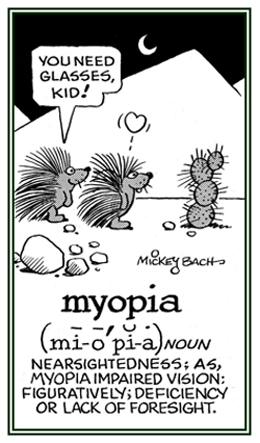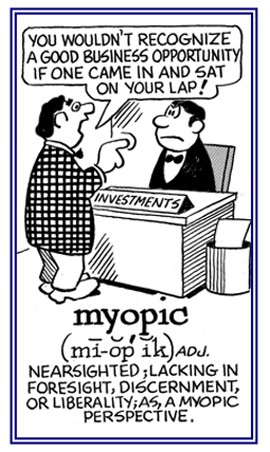op-, opt-, optico-, opsi-, opso-, -opia, -ops, -opsia, -opsis, -opsy, -optic, -opic, -opy
(Greek: eye[s]; sight; see, vision)
2. A medical condition in which everything perceived by the eyes appear to be bigger than it really is, often as a result of a retinal disease or a brain disorder.
3. The visual perception of objects as being larger than they really are.
2. A lack of imagination, discernment, or long-range perspectives when thinking about or planning something: Due to a condition of myopia, Ricky had real problems with making future arrangements by not being able to envision what to do the following year.

Go to this Word A Day Revisited Index
so you can see more of Mickey Bach's cartoons.

Go to this Word A Day Revisited Index
so you can see more of Mickey Bach's cartoons.
2. Relating to the lack of discernment or long-range perspective when thinking or making plans.
Smoking tobacco may impair the ability to see at night. Hypoxia associated with being above sea level in an aircraft will also decrease night vision.
2. The inability to see well under scotopic (dark) conditions, due to faulty rod function.The “rod” used here refers to any of the photoreceptor cells of the retina serving scotopic vision. “Scotopic vision” designates the dark-adapted state of vision, in which color perception is replaced by shades of black and white. It is served by the rod photorecptors.
3. A condition of the eyes in which the person can see well during the day, in a strong light, or on bright days, but see poorly at night, in a faint light, or on dull or dark days; night blindness; day sight.
4. The opposite of nyctalopia is hermeralopia, or day blindness.
Related references to "eye" or "eye part" word families: blepharo-; core-; corneo-; eye, eyes; irido-; lenti-, lens-; lenticulo-; ocelli-; oculo-; ophthalmo-; phaco-; pupillo-; retino-; uveo-.
Cross references of word families that are related directly, or indirectly, to: "appear, visible, visual, manifest, show, see, reveal, look": blep-; delo-; demonstra-; -orama; pare-; phanero-; phant-; pheno-; scopo-; spec-; vela-, veal-; video-, visuo-.


